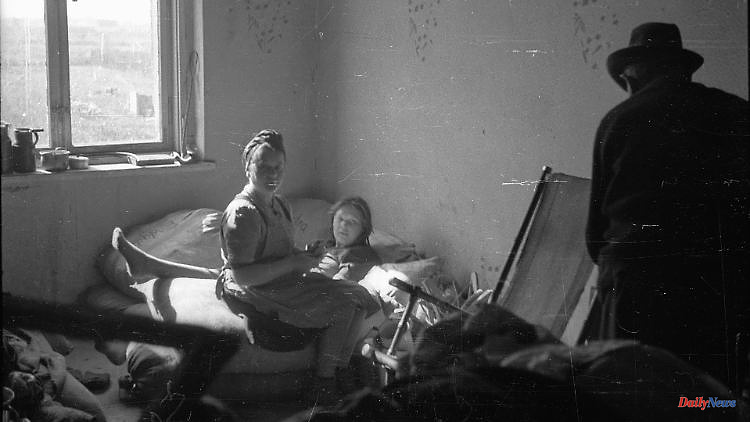At the end of the Second World War, millions of people are fleeing and new borders are being drawn. Germans had to leave the area east of the Oder and Neisse rivers, and some Poles were forcibly resettled here. They move into each other's houses.
Millions of people of German origin left the areas east of the Oder and Neisse behind at the end of the Second World War. From then on, the former homeland of the Germans was in Poland. What the fugitives could not load onto wagons remained behind. Resettlers arrived in the former German places in "regained Poland" to settle. One of the Polish tales is how a family comes into the assigned apartment. Not only is all the furniture there, the children's beds, the piano, the cupboards full of dishes, but also the still warm soup in the pot. Which the Polish newcomers eat, not without fear that they might be poisoned.
Karolina Kuszyk is a descendant of these people, German was simply part of her childhood in Legnice. Just like the ambivalent feelings about it. In the Lower Silesian former Liegnitz one could not escape them, the bowls with German inscriptions, the ovens with German names, the manhole covers, even in the cemeteries the number of German dead is overwhelming. In "In the Houses of Others - Traces of the German Past in Western Poland" the Polish author compiles almost 400 pages of what she has found in archives and books or what people have told her in countless encounters.
Her book was first published in Polish in 2019 and took a look at Polish history, which must also be painful for the country. Kuszyk describes impressively that those who arrived were also displaced persons who were at odds with the "blessings" of their new homeland. The houses and apartments had nothing familiar to those who now had to settle here. The cupboards and beds still breathe their previous owners, the high ceilings, the electric light seemed cold and forbidding. Mixed with the hopes for a better future was the fear that this life might not last either.
You could lose the living space that you had just moved into at any time through arbitrary action by the authorities or violence. This was the experience of many of those who were themselves displaced from what is now western Ukraine. Some tried out several accommodations until one met their expectations. Others were chased away by Soviet soldiers or stronger compatriots until they finally found a place to stay that no one would dispute with them.
Even the things that were loved in the apartments and had somehow come into their possession turned out to be bulky. There were bowls and pots, bedsteads and tablecloths, cupboards and hangers. They were all poniemieckie - literally translated: formerly German or post-German.
Some simply continued to use these things, others used them as well, but never lost the feeling of alienation or even disgust towards these everyday objects. Still others consistently destroyed what they found or from then on lived like in a museum so that they could show everything when the previous German owners came back. Kuszyk writes about how "we had to knock off the German lettering with German hammers and sweep up the German dust with German brooms in order to be able to feel at home".
It's not easy, but the author and historian of everyday life isn't exactly squeamish about her fellow countrymen. The crumbling houses and apartments that the new residents hardly seem to care about, the destroyed cemeteries, the tombstones that serve as sandpit borders and for road construction. Kuszyk describes all of this precisely, as well as the irritated looks at those who, for a variety of reasons, were more friendly or appreciative of German things.
Decades later, you only have to dig a few centimeters deep or simply stroll through a flea market to find the footprints of the others. Actually and symbolically, a network of cellars and tunnels remained, where the poniemieckie survived. "We suspect that the underground tunnels, undiscovered and unsecured, could collapse beneath us at any time," writes Kuszyk. Although people are getting used to the political post-war order, the shock of flight and expulsion has had a long-lasting effect.
"In the Houses of Others", translated by Bernhard Hartmann, is written for Polish readers. You can see that in the many cross-references to authors from the country, of whom Olga Tokarczuk is probably the only one who is known in this country. When reading it, it becomes abundantly clear that there is a completely different view of the end of the Second World War and its consequences than the German one. While the associations of expellees are still mentioned at the beginning, the German then increasingly disappears in favor of an examination of the growth of a Polish identity in the "regained areas". The descendants of the settlers and forced resettlers now know of no other homeland than this one. And the German bowl for dough or kutia, a sweet grain dish based on an East Polish recipe, has a swastika on the bottom.












